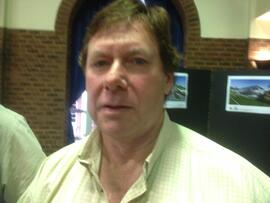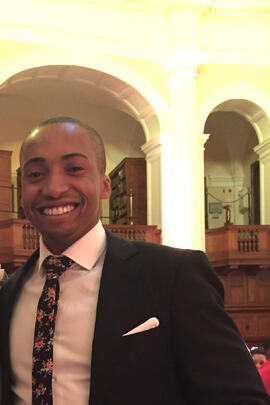Interview with Walter Cronje 1985.Board of Governors 2005 - 2010
- ZA ZAR STDS 202000956
- Stuk
- 2012
Interview with Walter Cronje - 1985
Walter started at St David’s in 1977 in standard 2 when his family returned to South Africa from
the UK. Walter’s father worked for BP which involved a lot of travelling which made him more
forward thinking and open to new ideas.
Mr Manolios was then head of the primary school and Br Timothy head of the high school until
Mr Murphy followed by Mr Frielick.
He recalls his first day in standard 2 N with Mrs Napier. He wasn’t used to wearing a cap as he
hadn’t worn one in the UK and was curtly told to take off his cap when a teacher greeted him.
Mrs Napier was scary and had a selection of canes in her office which she used liberally. He
remembered one occasion when Matthew Slavin was standing in line waiting for his book to be
marked and Mrs Napier put a staple straight through his thumb, there was also another incident
involving Ross Alcock. Walter had to write everything in italics with pen and ink and believes
that is why he can actually write well today.
Walter recalled a school trip in 1978 or 9 to the middle of Soweto. The boys visited a school to
hand over donations. Mrs Kenesovitch and HeatherJoseph were involved. He remembers
“Julius Caesar” was the standard 5 school play.
In primary school Walter learnt to play soccer, although he had played club rugby in England
and scored the quickest goal ever. He also played cricket and made the A team. When boys
reached standard 4 and 5 soccer stopped, rugby was introduced and the boys played rugby
U13, C and D teams for the high school. It was a great idea as the boys were introduced to
rugby and became integrated with the high school boys.
In the high school Walter played rugby, which was compulsory and cricket and participated in
athletics inter-school meetings. He was named the cricket 1st team captain in standard 9 and
again in matric. He loved school and became head boy in his matric year. One bad experience
he recalls is being asked to play in the open age group when he was currently playing in the
U14 team and his father refused. He played in the Beckwith week for 3 years and other
tournaments but it was rare in those days for St David’s boys to be selected for provincial
teams. Walter was awarded colours for rugby in standard 9 and used to go to the Wanderers
U20 rugby practise after cricket practise at school. In Craven Week he and Brett Airey were
selected to play together with Sandringham’s forward pack and Sandown’s backs against St
Stithians 1st team and they beat them 55-0. Most of the English speaking schools in
Johannesburg had excellent teams at matric level but very few boys went forward into the sport
as a career unlike James Dalton and Brian Habana.
Mr Murphy was well liked a big strong man, a disciplinarian and very strict. Walter remembered
that it was decided to put on a school musical “Oliver” and Debby Hurley, the primary school
Music teacher was conducting auditions. All the school was herded into the hall and it was
chaos, a free for all, Debby Hurley eventually had enough and walked out and everyone calmed
down. Mr Murphy walked in and blasted them all saying they had no manners, no respect and
shouldn’t treat a female member of staff in such a fashion. He then picked out some boys to go
on stage and audition and they all sang beautifully. Another incident occurred when Nick Pruim
and some of the boys were hoping to go to Argentina and Mr Murphy made them do 1000
squats, in spite of that they never got to Argentina! The boys saw him on tv on a programme
called “Late Nite Owls” showing how people earned a living after hours. Mr Murphy was a
professional wrestler performing under the guise of Sean Reagan and was unmasked. The next
day Br Anthony turned up and Mr Murphy was never seen again at the school.
Walter came second in his class in standard 2 and from then on came first, achieving seven
distinctions in his matric. He remembers “Julius Caesar was the standard 5” school play.
Some of his school mates were Rommel Gobel, Vusi Wandile, Shongwe Moponya – Solly, his
father always wanted his sons to go to a Marist school and Solly’s older brother Isak was also a
pupil.
Teachers - he will never forget Willy Castle! One of the greatest teachers was Tom MacFaden
an ex-Brother who taught History and French, he could get the best out of everybody, was
worldly wise, well travelled, well educated and well read. He taught History from matric essays
not textbooks, his goal was for everyone to pass matric and go on to university. He is now living
in Greece. Trudy Elliot, English teacher who made the boys write a matric essay every weekend
or she took their honours blazer away. Mr Collier, an Obs old boy who taught Maths, Heather
Joseph, Art in primary school. All the teachers were flamboyant and larger than life. Walter had
a number of Biology teachers and remembers that the boys had a record in standard 7 for
getting rid of the highest number of Afrikaans teachers.
Brother Timothy ran the school as an autocracy not a democracy and wasn’t answering to the
voice of the people and if the class didn’t like a particular teacher they just had to put up with it.
Walter believes that there is too much leniency these days rewarding mediocrity and feels
strongly that most especially in a boys school there needs to be a rigid line of discipline. He
recalled Br Bernard caning a boy for accidentally knocking a rubber off his desk, the boys knew
the rules and if they were contravened there were consequences. Walter cannot recall anyone
at school with him having ADD of being hyperactive. The boys started school at 7.15am and
after school there was sport either competitive or practise sessions up until 6.00pm and then
they had to go home and do their homework.
One of the negative things Walter recalls was being told at each assembly of former pupils who
had been killed whilst on border duty. A former pupil Andrew Petit who scored a hole in one
whilst at school winning a car sponsored by Volkswagen was one of those who went to the
border and was killed.
Walter was one of the last young men to do military service after varsity and felt that it had given
him a different perspective and the ability to judge what’s important and what’s not.
In his final matric year, Walter remembered Religious instruction classes were a farce and as a
consequence a decision was made to send all the non-Catholics to a retreat at Hartbeespoort.
Two Computer Science teachers were assigned to supervise the boys. The retreat ended up in
a drunken mess, boys went off in their parent’s boats on the dam and walked out of the camp.
The boys’ honours blazers were taken away and, because of this you won’t find many boys of
that time coming back to St David’s. Sadly of the 30 – 40 matrics who were expected to get the
highest number of distinctions ever, only achieved 13, the timing of the retreat was appalling.
Walter feels that if there should have been a more visible handing over interim phase with the
brothers on hand to instil the Marist ethos and way to the lay teachers and Heads which would
have helped enormously. Unfortunately the brothers seemed to disappear and just hand over to
the lay teachers. In all likelihood the school could not have afforded to entice a top principal at
the time, the school certainly didn’t have the funds to replace the school bus.
Walter is currently with the Jardine Lloyd Group. Walter was chairman of MOBS for 2 years
from 2000 and was on the board of governors from 2005 – 2010 as he felt the need to sustain
the long term stability of the school. If you want continuity and change it is often difficult to get
the right people to serve and a strong board is needed. The Foundation was a concept to raise
enough capital to enable previously disadvantaged and needy boys to be able to attend St
David’s.
JLE May 2012
Egenrieder, Julie


